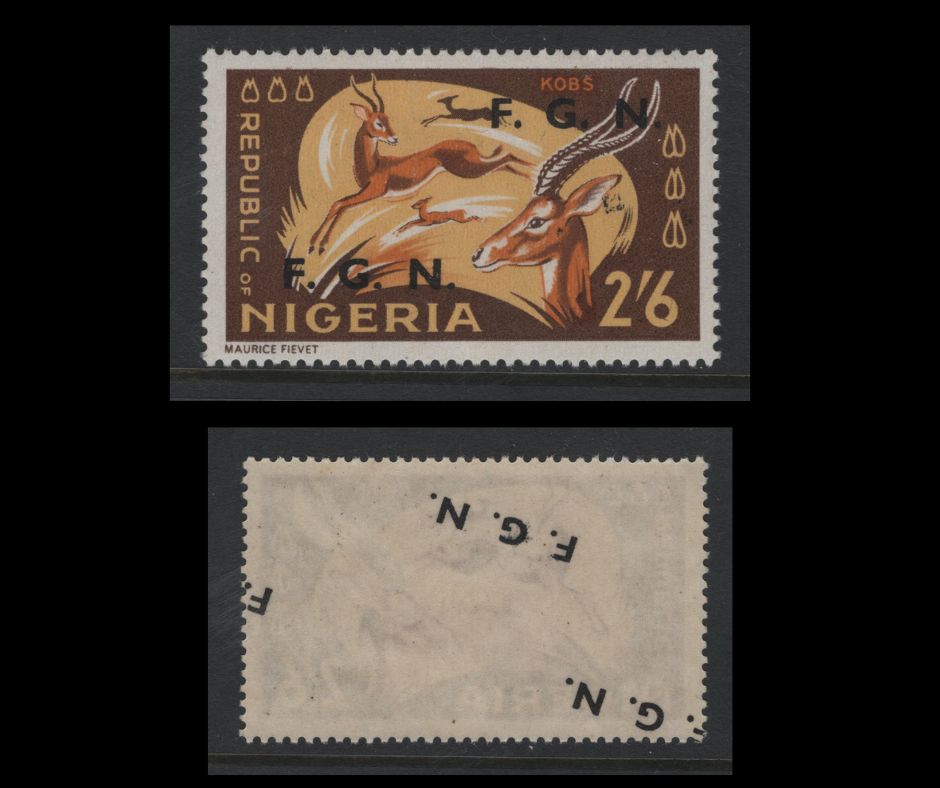Brixton Chrome
Nigeria SG#182var 2/6d Kobs, 1966-1973 Wildlife Definitives, A VFNH Single, Chocolate Brown Background, Overprinted FGN On BOTH Sides, Horizontal On Face, Inverted & Downward Slanted On Back, One & Part Of Second Overprints Visible On Back
Nigeria SG#182var 2/6d Kobs, 1966-1973 Wildlife Definitives, A VFNH Single, Chocolate Brown Background, Overprinted FGN On BOTH Sides, Horizontal On Face, Inverted & Downward Slanted On Back, One & Part Of Second Overprints Visible On Back
Couldn't load pickup availability
A VFNH single of the 2/6d multicoloured Kobs from the 1966-1973 Wildlife Definitive Issue on HF/mottled HF paper, chocolate brown background, overprinted FGN on both sides, horizontal on face, inverted & downward slanted on back, one & part of second overprints visible on back, rare, first time we have seen or offered.
2019 Gibbons does not price these overprints or their associated varieties. Our estimates are based on what we have sold these overprints for in the past, or where we have never offered them before, on items of similar scarcity. Based on this we estimate the value of this at $100. The stamp offered here grades 80 as follows:
Centering/Margins: 50/70
Paper Freshness: 5/5
Colour: 5/5
Impression: 5/5
Absence of Visible Paper Flaws: 5/5
Perforations: 10/10
The issues of Nigeria from 1956 to 1968 were, withy a few exceptions, printed by Harrison and Sons in the UK. So, they all share the general characteristics found in the photogravure issues that Harrisons produced for the Commonwealth countries at this time, namely in regards to paper fluorescence and gum. The paper was chalk-surfaced and the gum for this period was a very matte gum Arabic that looks almost like PVA, but isn't. It has horizontal striations, and you can find it on the definitive and commemorative sets of most British colonies from 1960 to about 1966-1967, when Harrisons replaced this gum with a shinier gum Arabic that has a crackly appearance, and more closely matches what we think of when we hear the term "gum Arabic". In terms of fluorescence the chalk coating is highly reactive giving a glow under UV that varies from LF to HB, but is most usually either HF or HB. The backs of the stamps are usually DF until the mid 60's when LF-fl or MF-fl is the standard. The DF backed stamps you can sometimes fid the paper flecked, but not sufficiently to make the paper look anything other than DF on the back.
The FGN Overprints were initially prepared in 1968 for use as official stamps, but the project was abandoned. However, not before some stamps had already been distributed to post offices, at least in Lagos, and possibly other villages, such as Ibadan or Kano, though some of those may have wound up there by distribution through government departments. Gibbons lists 4 documented uses of these stamps, in error in each case: (1) in October 1968 to January 1969 from stocks that were sold over the counter in error; (2) In April 1969 by the Lagos Federal Income Tax Office; (3) the 1/3d on commercial mail to the UK in May 1969 and (4) the 3d, 4d and 2/6d values in 1973. There is no documented use therefore of the 1d, 2d, 5/- or pound, so one would assume that used examples are from the initial over the counter sale. There are other uses I have found: (1) Ibadan in April 1969, which would likely be the local tax office, from stocks distributed up from Lagos; and (2) Kano July-August 1969, also likely originating from the local tax service office. The piece from lot 445 confirms this. There may be others, but the rarity of these stamps in used condition may preclude this. Basically, the values other than the 1d, 2d, 3d, 4d, 2/6d and 5/- are, in my opinion, on a par with the Independent Anguilla Overprints in terms of their rarity. In a decade of buying regularly on e-bay and in reputable auctions I never say the 1/- offered in any condition at any time. I never say any of the overprint errors offered here. I saw the basic mint stamps with normal overprints a handful of times - maybe 20, for all values other than the pound, which I only say a few times. This is the first time I have ever seen any of these postally used.
Share


